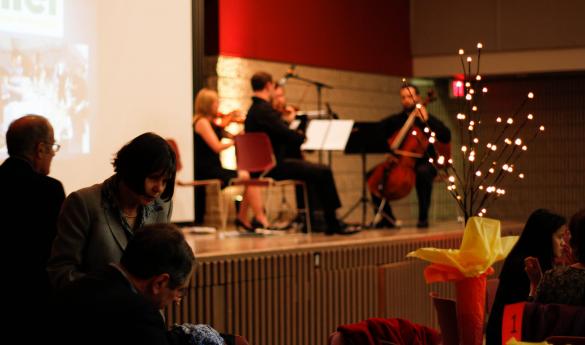Hillel hosts dinner with Holocaust survivors
Hillel hosted a dinner in the Hub ballroom, inviting students and Holocaust survivors to connect and share stories. The Expressions of the Holocaust dinner, held on Nov. 13, hosted over 40 Holocaust survivors. Hillel Executive Director Ross Diamond said the dinner was a multi sensory event. Music was performed while a silent art auction was held.
Hillel hopes to create bonds between generations, to allow survivors stories to continue being told and never be forgotten by younger generations. Some survivors such as keynote speaker Irene Weiss have spoken at Mason before, while others were new to campus.
Holocaust Survivor and Russian native Boris Brailovsky, who came to the dinner from Gaithersburg, Maryland, said he thought the event was a success.
"It's beautiful and it should be every year to continue this memory from generation to generation," Brailovsky said.
This event was the first of its kind at Mason. All students were encouraged to attend, regardless of religion. A diverse group of Student Ambassadors was assembled to host a Holocaust survivor each, helping them around campus and seeing to any of their needs through the night.
Senior and communications major Kaetlin Ritchie became a student ambassador because of her involvement with Hillel. Ritchie said the Holocaust has affected her life in many different ways and helped influence her to teach at Congregation Beth Emeth, a synagogue in Herndon.
"It's a very scary thing to think ‘How do I teach thirteen year olds about something like this’. So that was another moment where it's such a part of my upbringing. Just knowing it, feeling it, and feeling compassion for it; but it's so challenging when you have to teach someone else about it," Ritchie said.
Student engagement intern and sophomore Tess Weiss became a student ambassador because of her involvement in Mason Hillel. However, not every student ambassador had close ties to Hillel.
"The ambassador program students are… all kinds of students from all different grades, all different majors, all different ethnicities and religions coming together to kind of help the survivors through the program," Weiss said.
Junior student ambassador Samantha Vaughn found out about the opportunity through Facebook.
"I'm not really religious and I'm not involved in any religious organizations on campus but I think the important part is that it doesn't have to be about religion. Tonight is kind of just about listening to the stories, the powerful experiences that these people had, going through the Holocaust," Vaughn said.
As the number of survivors decreases, History professor Marion Deshmukh expressed the importance of listening to their stories.
"It's for [students] to really understand and experience what these people went through, who could've been their grandparents of great grandparents. I think it's that connection between old and new generation, learning about the past and the commemoration," Marion Deshmukh said.
The event also observed the anniversary of the Night of Broken Glass, or Kristallnacht, which was an assassination attempt used by Nazis to vilify the Jewish community. Kristallnacht was a turning point for the war, Deshmukh said.
"Using that event, the government in Germany said the Jews are to blame for this, so they proceeded to vandalize all of the Jewish synagogues, smashing them, taking out the various prayer books and scrolls," Deshmukh said.
While the event only lasted from 6:30 to 9, its impact could be very large. Hillel hopes to eventually increase genocide and Holocaust education .
"The goal is to really work the students to move towards standing up for injustice and coming up with different tangible ways for students to stand up for it," Diamond said. "I'm going to engage the ambassadors and say 'what next?' because this is just the beginning of the conversation, not the end."

